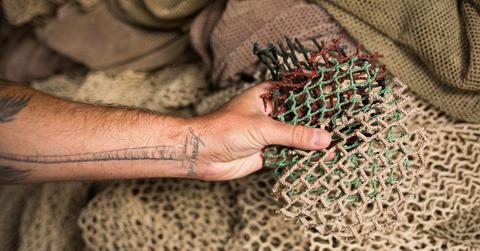The Importance of Transparency in Green Spaces: A Q&A With Outerknown
Outerknown is leading the menswear industry with their sustainable practices, and they're hoping to help other businesses do the same.
Updated Nov. 19 2020, 9:40 p.m. ET

If you've checked out menswear recently, you're probably familiar with Outerknown. They're a sustainable menswear brand that puts an emphasis on eco-friendly production and apparel. Their style is understated and classic while still feeling fun and new. Their products include a range of shirts, shorts, tees, tanks, trunks, and more.
In terms of sustainability, they're serious about transparency. Mark Walker, CEO, and Shelly Gottschamer, Head of Sustainability and Supply Chain, sat down with Green Matters for an email interview to discuss why they're passionate about sustainability, how small businesses can be more eco-friendly, and where they see Outerknown for years to come.
The following Q&A has been edited for clarity, flow, and length.
Green Matters (GM): For people outside of your industry, what's the easiest way to break down Outerknown's purpose?
Mark Walker (MW): For People and Planet. At Outerknown, we’re making every decision with the highest regard for the hands that make our clothes and the world we call home.

GM: What do you think the biggest challenge or obstacle is for brands to go green? 
Shelly Gottschamer (SG): The supply network of responsible manufacturers is a smaller pool. They typically lean towards larger suppliers, as the investments are higher and access to these suppliers (for smaller brands) is not always available. Cost will also continue to be a challenge. Responsible manufacturing costs more, period; either through social and labor practices, or environmental standards…not to mention preferred fibers.
MW: Making things “sustainably” takes longer, costs more, and has a significantly reduced number of factories, mills, and trim suppliers. The challenge for most brands is that they have created an established culture and process that doesn’t include sustainable practices; therefore, determining where and when to start is difficult.
GM: Why is open-sourcing important?
SG: It is critical to reach scale in responsible manufacturing. Not only to reduce costs, but to reduce the environmental impacts of our industry. Open source is a critical component in reaching scale. We all need to do this together to make this a standard every day practice.
MW: A huge part of why Outerknown exists is to inspire change in the industry. We cannot move the needle alone, and if sharing our successes will help more brands do it right ‘For People and Planet,’ then it’s the right thing to do.
GM: What advice do you have for brands or small businesses who are hoping to embark into more sustainable practices?
SG: Collaborate as much as possible.
MW: Just start. Don’t focus on the when or how or is it enough. Just start making decisions that are better for people and the planet by using preferred fibers, picking better partners, etc. It needs to be part of the company culture and in every conversation, not a department within the business.
GM: For you personally, why is sustainability important?
SG: My family are farmers, and through farming we have seen the effects of the environmental crisis. We have the opportunity in apparel to improve our practices and create change. We just have to stand up together and ask; as consumers and as business leaders.

GM: What do you think the biggest misconception is about sustainability? 
MW: That no matter what you do, it isn’t enough, so why bother? Everyone needs to start somewhere and all of our decisions have an impact.
GM: Why is transparency so important in a green space?
SG: Sustainability starts with transparency. If a brand is making a claim and they are backing it up with data, then they have done their homework to put sound practices in place. A good example of this is publishing a supplier list; to put this out there means you have done the due diligence. It keeps us honest.
MW: To avoid greenwashing. It’s important for people to be educated and properly informed so they can choose to make the decision that they believe will have the best impact.
GM: Where do you see Outerknown in 5 years? 10?
MW: Significantly larger, reaching more customers, changing peoples’ perception of sustainable clothing, and collaborating with more brands to make positive change. We hope to lead the charge on making it easier for customers and brands to make better decisions with respect to the impact clothing production has.